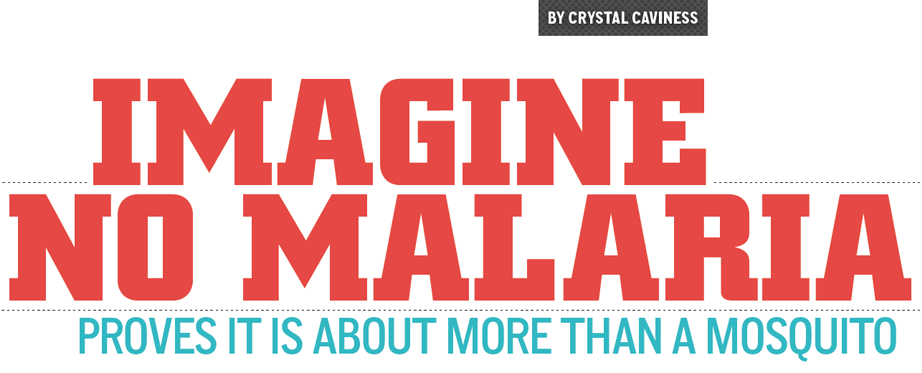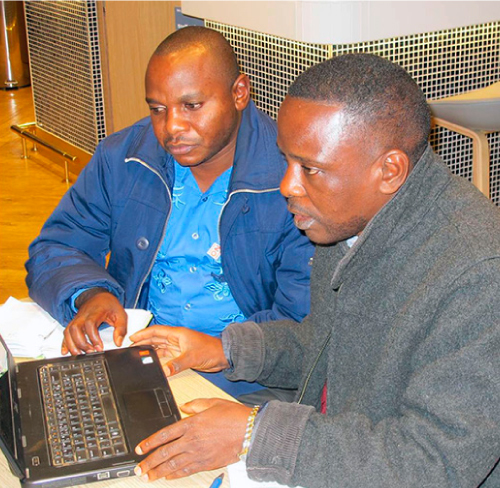



Habibatu Fugbawa speaks about the impact to the health of her community of mosquito nets distributed in 2010 by the United Methodist Church’s Imagine No Malaria campaign. Several villages in the Bo district of Sierra Leone received new, insecticide-treated mosquito nets in 2014 during the first planned redistribution to replace nets given four years ago. The United Methodist Committee on Relief coordinated the distribution.
UMNS/MIKE DUBOSE

Dr. Alexis Ngoy Kasole Maloba (left), United Methodist Church health coordinator in Democratic Republic of Congo, and Dr. Philippe Okonda Akasa, health coordinator for East Congo, examine data on malaria at the recent Alliance for Malaria Prevention Conference in Geneva.
INTERPRETER/GARY HENDERSON
Dr. Philippe Okonda Akasa, health coordinator for The United Methodist Church in East Congo, spends much of his time battling effects of malaria. Still, one of the most dramatic stories he tells has nothing to do with malaria. And everything to do with Imagine No Malaria.
Okonda tells of a young mother, a frequent visitor to a rural health clinic in eastern Congo, who spotted construction supplies stacked outside the facility. The woman knew the clinic well; she had given birth there six times. While it was the only such facility available to nearby villages, the clinic failed to meet most health-care standards, even operating without electricity.
The money for the new construction came from Imagine No Malaria, an initiative of The United Methodist Church to raise $75 million toward ending death and suffering from malaria through prevention, treatment, education and communication.
Surveying the pile of construction materials, the woman became excited, joyfully exclaiming at the sight of cement, lumber and solar panels that would provide electricity. There would be no more long nights spent in darkness at that clinic, nights that filled mothers with insecurity and fear and held danger for newborn babies, as she had learned firsthand.
In that very clinic, the mother had awakened to the sounds of her newborn crying. She snuggled her infant daughter closer to comfort her; yet, the crying continued. The first light of dawn revealed the unthinkable. As the newborn lay beside her mother in the darkness, rats had attacked the baby.
“In the darkness, no one saw or discovered the wounds on the child’s feet,” Okonda explained. “Part of this mother’s joy and excitement at seeing the cement and the solar panels was her realization of what electricity will mean for a child born at night at this clinic. These are the real realities of our brothers and sisters in Africa.”
The more than $65 million in cash and pledges already raised is providing insecticide-treated bed nets, bolstering the infrastructure of health clinics and doing much more throughout Africa. The fundraising has engaged United Methodists, young and old, who have organized pancake breakfasts, concerts, church fairs, 5K races, bake sales, community carnivals, auctions and other creative efforts.
‘What we provide is hope’
“This campaign found energy because of how it energized people,” says Pittsburgh Area Bishop Thomas J. Bickerton, who chairs the United Methodist Global Health Initiative. “Imagine No Malaria has been a chance to save people’s lives, and there has been no argument in that.”
Bickerton has led Imagine No Malaria since the campaign’s launch in April 2009. He has visited Africa many times to see firsthand how Imagine No Malaria funds are benefiting the continent. He tells the story from one of his early visits, where, in a remote village, a mother brought her sick baby to him and asked for prayer. “I held this baby in my arms,” he recalls, “and, the next day, the baby died.
“I go from that story to a similar occasion where I’m holding a plump little healthy baby who has been given life because of our work in Imagine No Malaria. To see the sorrow in the first mother’s face and then to see the joy in the other mother’s face is indescribable.”
Imagine No Malaria is about life and death. How to stay alive. How to prevent death. It starts with a mosquito whose bite kills one child every 60 seconds and ends with giving an entire generation hope for a healthy life.
“It goes from a dollar bill placed in an offering plate at a church in the United States to a small little hut in a village in Africa,” says Bickerton. “That dollar bill gives people hope. What we provide is hope.”
An instrument to save lives
Arlindo Romao knows all about the importance of prevention. As a boy, he suffered from malaria and diarrhea, and witnessed family members who also struggled with the effects of illness. Eight years ago, as a husband and father of four sons, Romao and his family began using insecticide-treated bed nets. The result is that only one of his sons has gotten malaria – and only once.
“When I learned about the cycle of malaria and mosquitoes, I realized it is possible to fight malaria in a simple way,” Romao says. “If all people in a community could become conscious of the role they each have in preventing mosquito bites and stopping their reproduction, we can overcome this problem.”
As Imagine No Malaria’s health-care coordinator in Mozambique, Romao now travels between villages to provide health information and teach malaria prevention.
“Since working with Imagine No Malaria,” he says, “I have learned how to implement malaria prevention programs. It’s because of this training and Imagine No Malaria funding that families in Mozambique are being saved from malaria. God has blessed me because I feel that I’m one of those being the instruments in saving people’s lives through this program.”
Dr. Alexis Ngoy Kasole Maloba, health coordinator in the North Katanga province of the Democratic Republic of Congo (DRC), is among those treating patients in the hardest-hit zones. Wearing an Imagine No Malaria pin on his shirt pocket, the physician recounts staggering statistics.
“In 2013,” he says, “there were 67,026 diagnosed cases of malaria in North Katanga.” The good news comes in his next sentence: “Only 98 deaths.”
The low ratio of deaths compared to the number of cases is a result of area health-care facilities providing free malaria medication and diagnostic kits to families, thanks to Imagine No Malaria.
Kasole also tells of the ripple effects of Imagine No Malaria, of how providing free medication and blood transfusions does more than keep families healthy.
“Because of Imagine No Malaria, revenue in the family goes up because people aren’t as sick and can go to work,” he says.
Hannah Mafunda trains health-board coordinators throughout Africa to complete grant applications, hire staff and collaborate with other organizations, such as The Global Fund, to maximize resources. Training is key to success, she says. “If you have the heart but lack the skills, it will not come to pass.”
Mafunda brings both to the fight against malaria.
As the health-board coordinator for Zimbabwe, she also distributes insecticide-treated bed nets in her country and implements other strategies for treating and preventing malaria.
“There is nothing (as) beautiful as people of God coming together and focusing on one cause and fighting for the life of people,” she says.
‘Let’s not stop now’
Pierre Omadjela directs communications and development for the Central Congo Annual Conference, which includes the DRC, Tanzania and Zambia. A lack or shortage of Internet connectivity, computers and technologically savvy people make it difficult for Omadjela to share important information about health care, malaria prevention and other topics with communities, hospitals and health clinics. However, technology is changing that. A grant from United Methodist Communications provided a ruggedized laptop with Frontline SMS and modem, which enables him to do mass text messaging without the Internet.
“Technology is making such a difference,” Omadjela says. “I used to receive information about a situation one month after the event took place.” With Frontline SMS technology, he can know what happened the same day and act quickly by sending health messages to help prevent illness and educate church members.
“Support of technology in developing countries is just one of the ways we are investing in saving lives from malaria,” says the Rev. Larry Hollon, general secretary of United Methodist Communications. “Our goal is to use every available communications resource, from technology to education, to improve quality of life and, as in this instance, to save lives globally.”
As Imagine No Malaria heads into the final months of the fund raising campaign and with approximately $10 million left to reach its goal, the tasks are far from finished.
“At this point in the campaign, there is so much satisfaction,” Bickerton says. “We have been part of a global fight against malaria. But at this point, there is good reason to say ‘Please don’t back off now.’ If we downplay this campaign in the near future, we cut off some of the most amazing infrastructures that have been made. These mosquitoes are resilient. The minute you back off, they get stronger.
“We are close to a vaccine. We are close to seeing sustainable reductions in malaria. Let’s take it home. Let’s do everything we can.”
“One of the greatest joys is when I get word that a community has had zero malaria deaths,” Bickerton says. “We are there. We are there. Let’s not stop now.”
Crystal Caviness is a public relations specialist at United Methodist Communications, Nashville, Tenn.
Celebrate World Malaria Day
World Malaria Day is April 25. On that day, people worldwide join forces to bring awareness to the plight of people living amid the stronghold of malaria, a preventable and treatable disease that kills an estimated 600,000 people annually.
Individual annual conferences have plans in place. United Methodists across the Virginia Conference will host lemonade stands in their communities. Throughout the New York Conference, United Methodists will hold fashion shows displaying the latest designer creations using bed nets. The Wisconsin Conference will sponsor walks for Imagine No Malaria, with a goal of 50 sites throughout the state.
United Methodists everywhere can participate by making a first-time pledge, renewing a current pledge or planning a fundraising event to raise awareness and bring change through Imagine No Malaria.
To learn more about events – including what is planned for your conference – visit ImagineNoMalaria.org.

